

Journalism 3.0 - Journalism 3.0 - Media Ecology and the Future. Traditional journalism is challenged by social media’s tenet that journalists are not superior to users.

Social news, citizen journalism and democracy. This article aims to contribute to a critical research agenda for investigating the democratic implications of citizen journalism and social news.
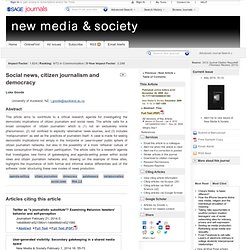
The article calls for a broad conception of ‘citizen journalism’ which is (1) not an exclusively online phenomenon, (2) not confined to explicitly ‘alternative’ news sources, and (3) includes ‘metajournalism’ as well as the practices of journalism itself. A case is made for seeing democratic implications not simply in the horizontal or ‘peer-to-peer’ public sphere of citizen journalism networks, but also in the possibility of a more ‘reflexive’ culture of news consumption through citizen participation. . © The Author(s), 2009. Untitled. Enclave Extremism and Journalism's Brave New World. Senator Ted Kennedy arrives to campaign for Barack Obama at a rally at East Los Angeles College in Monterey Park, California.
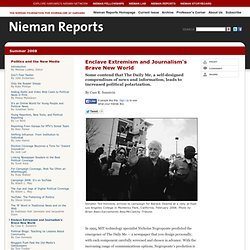
February 2008. Photo by Brian Baer/Sacramento Bee/McClatchy Tribune. In 1995, MIT technology specialist Nicholas Negroponte predicted the emergence of The Daily Me — a newspaper that you design personally, with each component carefully screened and chosen in advance. With the increasing range of communications options, Negroponte's prediction is coming true. With just a few clicks, you can find dozens of Web sites to show you that you are quite right to like what you already like and to think what you already think. If you want to read essays arguing that your preferred political positions are the right ones, the technology is available to allow you to do exactly that. Of course, self-sorting is nothing new.
Polarizing Points of View What's wrong with this situation? What was the effect of discussion? The Role the Media Play Cass R. The Internet is making us stupid - Barack Obama News. Freedom of choice is not always good for democracy.
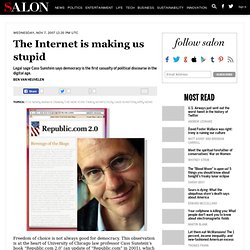
This observation is at the heart of University of Chicago law professor Cass Sunstein’s book “Republic.com 2.0″ (an update of “Republic.com” in 2001), which argues that our country’s political discourse is fracturing in the information age. Sure, the Internet has been a boon to democracy in all sorts of ways, Sunstein acknowledges — but if new technology gives us unprecedented access to information, it also gives us more ways to avoid information we don’t like. Conservatives are increasingly seeking only conservative views, liberals are seeking only liberal views, and never the twain shall meet. Sunstein’s career has bridged the political divide. As an attorney in the Justice Department’s Office of the Legal Counsel, he was an advisor to both Jimmy Carter and Ronald Reagan. Breaking Out of the Echo Chamber » contentious.com - Amy Gahran’s news and musings on how we communicate in the online age.
This morning I listened to an excellent Radio Open Source interview.
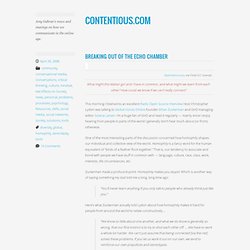
Host Christopher Lydon was talking to Global Voices Online founder Ethan Zuckerman and GVO managing editor Solana Larsen. I’m a huge fan of GVO and read it regularly — mainly since I enjoy hearing from people in parts of the world I generally don’t hear much about (or from) otherwise. One of the most interesting parts of the discussion concerned how homophily shapes our individual and collective view of the world. Social software, serendipity and salad bars. (Mmm. Sybillance…) What Your Friends Don’t Know About You. How well do you know your friends’ political views? According to recent work by Winter Mason, Duncan Watts, and myself, you probably don’t know them as well as you think. In particular, we found that when friends disagree on a political issue, they are unaware of that disagreement about 60% of the time. Even close friends who discuss politics are typically unaware of their differences in opinions. Lauren Rivera - Faculty - Kellogg School of Management.
Homophily, serendipity, xenophilia. Posted by Ethan on Apr 25th, 2008 in Media, xenophilia | 38 comments There’s been a small but fascinating blog conversation going on surrounding the term “homophily”.
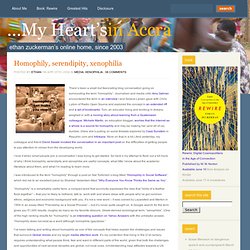
Birds of a feather by smith-lovin, mcpherson, and cook. Shankar Vedantam - Why Everyone You Know Thinks the Same as You - washingtonpost.com. You can see it the next time you visit your office cafeteria or a nearby park: Whites sitting together with whites, blacks with blacks, young people with other young people.
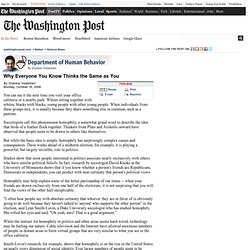
When individuals from these groups mix, it is usually because they share something else in common, such as a pastime. Sociologists call this phenomenon homophily, a somewhat grand word to describe the idea that birds of a feather flock together. Thinkers from Plato and Aristotle onward have observed that people seem to be drawn to others like themselves.
But while the basic idea is simple, homophily has surprisingly complex causes and consequences. Three weeks ahead of a midterm election, for example, it is playing a powerful, but largely invisible, role in politics. Studies show that most people interested in politics associate nearly exclusively with others who have similar political beliefs. While the instinct for homophily in politics and other areas seems hard-wired, technology may be fueling our nature.